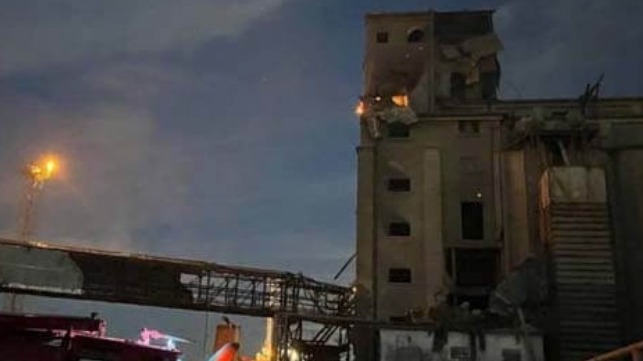Traffic Slows at Ukraine's Danube Ports After Russian Drone Strikes

Traffic at Ukraine's Danube River grain ports appears to have slowed down after the recent Russian strikes on silos and grain elevators, based on ship tracking data.
Russian drone strikes and threats against neutral shipping have already shut down Ukraine's Black Sea grain ports around Odesa, making the Danube River terminals at Reni and Izmail the only options for seaborne exports. These secondary ports are too small to handle all of Ukraine's voluminous agricultural exports, according to the Ukrainian government and its international partners, but they provide some amount of backup.
However, even the activity along the Danube is now in question after Russian drone strikes on Reni and Izmail last week. The damage to silos at Izmail destroyed enough grain to feed 66 million people for a day, according to UN Humanitarian Coordinator for Ukraine Denise Brown, and appears to have slowed loading as well.
Over 20 freighters and bulkers are currently anchored on the Danube downstream of Izmail, waiting to load or depart, based on data provided by Pole Star. At least a dozen more are anchored in the river near Reni. On shore, hundreds of trucks laden with outbound grain have reportedly stacked up outside of Izmail. "We are waiting for the boats to arrive. Today, we called our manager to ask when? He replied 'I don't know,'" one trucker told Radio France.

that matters most
Get the latest maritime news delivered to your inbox daily.
The disruption has had an impact on the insurance market, too. Previous reporting suggests that at least two Western underwriters are limiting war risk cover for the Danube River route, and there are questions over how many shipowners will have interest in continuing to serve these ports, given the potential hazards.
If Reni and Izmail cease operation, either due to damage or the reluctance of foreign-flag shipping, Ukraine's farmers will have few options. Poland, Romania and Hungary have stopped accepting overland wheat imports in order to defend their own farming sectors from ultra-low-cost Ukrainian grain. Ukraine's agricultural export conglomerates have already stopped buying from smaller wheat producers, farmer Fedir Kabak told Radio France on Tuesday, because they do not have a reliable way to move the product to market.
